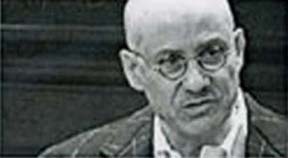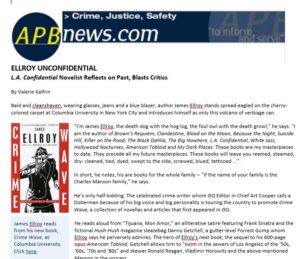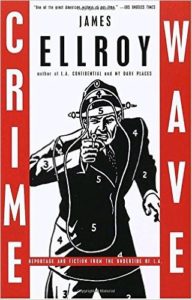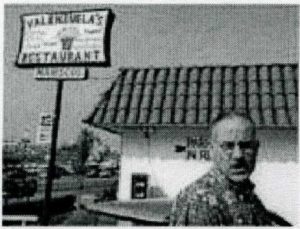L.A. Confidential Novelist Reflects on Past, Blasts Critics

At Columbia University, Ellroy said he was pleased with the outcome of the L.A. Confidential movie.
By Valerie Kalfrin
APBNews.com, March 30, 1999
Bald and cleanshaven, wearing glasses, jeans and a blue blazer, author James Ellroy stands spread-eagled on the cherry-colored carpet at Columbia University in New York City and introduces himself as only this volcano of verbiage can.
“I’m James Ellroy, the death dog with the hog log, the foul owl with the death growl,” he says. “I am the author of Brown’s Requiem, Clandestine, Blood on the Moon, Because the Night, Suicide Hill, Killer on the Road, The Black Dahlia, The Big Nowhere, L.A. Confidential, White Jazz, Hollywood Nocturnes, American Tabloid and My Dark Places. These books are my masterpieces to date. They precede all my future masterpieces. These books will leave you reamed, steamed, dry cleaned, tied, dyed, swept to the side, screwed, blued, tattooed …”
In short, he notes, his are books for the whole family — “if the name of your family is the Charles Manson family,” he says.
He’s only half-kidding. The celebrated crime writer whom GQ Editor in Chief Art Cooper calls a Doberman because of his big voice and big personality is touring the country to promote Crime Wave, a collection of novellas and articles that first appeared in GQ.
He reads aloud from “Tijuana, Mon Amor,” an alliterative satire featuring Frank Sinatra and the fictional Hush-Hush magazine sleazebag Danny Getchell, a gutter-level Forrest Gump whom Ellroy says he perversely admires. The hero of Ellroy’s next book, the sequel to his 600-page opus American Tabloid, Getchell allows him to “swim in the sewers of Los Angeles of the ‘50s, ‘60s, ‘70s and ‘80s” and skewer Ronald Reagan, Vladimir Horowitz and the above-mentioned Manson in the process.

Published at APBNews.com
The ‘gleeful misanthrope’
“I like the whole construct of a good-natured, intransigent, intractable … gleeful misanthrope,” he says, listing the president as a contrasting example. “Bill Clinton is a cowardly, sexual-harassing misanthrope who has other people lie for him and … counts on his power and his paid dissemblers to get him through. Danny Getchell is an out-front racist homophobe alcoholic junkie.”
Drawn to “bad white men doing bad things in the name of authority,” Ellroy admits, “I hate the noble, centered hero, the guy who bucks the system, who’s really too sensitive to live, had bad traumatic experiences, maybe in Vietnam, that shaped him forever. I like the key players. I like the leg breakers of history.”
Though in the same city as demonstrators protesting the Feb. 4 police shooting of unarmed street peddler Amadou Diallo, Ellroy says he has never heard of the case. Yet he notes, “That stuff happens all too frequently.” He recalls how, in 1966 on Wilshire Boulevard, two blocks from where he sets a death-by-police shootout in “Tijuana, Mon Amor,” the LAPD shot a mentally retarded man “who was going for his wallet to pull out a card that said, ‘I have a speech impediment; I can’t talk that well.”‘
“The disapproval is always there in my books,” he says. “And it’s never explicit. You don’t need to preach.”
A high school dropout who “grew up at 29” after “drinking, using drugs, breaking into houses to sniff women’s undergarments, stealing, and doing county jail time,” Ellroy left Los Angeles in 1981 because “I realized I had taken burned-out, sex-obsessed , obsessive L.A. cops as far as it could go.” He lives with his wife, Helen, in Kansas City, visits Los Angeles often for research and writes all his work in longhand to be typed by a woman in New Rochelle, N.Y. (“Fax and FedEx is how we accomplish this,” he says.)
‘The more contained holocaust’
 Crime in the ‘50s and ‘60s is his focus, because “I like the more contained holocaust,” he says, breaking into a one-liner to illustrate his fascination.
Crime in the ‘50s and ‘60s is his focus, because “I like the more contained holocaust,” he says, breaking into a one-liner to illustrate his fascination.
“Two cops are sitting around talking and one says, ‘I busted a 2-yearold crack dealer today.’ Cop number two says, ‘Ah, that’s nothin’, man. I busted a 6-month-old crack dealer, and he was dealing … out of his crib.’ We’re inured to crime, to a great deal of it today,” he says. “I like setting it back in an outwardly more placid time, a statistically less violent time, and giving my readers a more contained apocalypse. A pre-media apocalypse.”
The LAPD “were very, very, very bad in the ‘30s,” he adds. ‘They were very, very bad in the ‘40s. They were very bad and a half in the ‘50s, ‘60s and ‘70s. They were bad in the ‘80s.” Now, however, he says they’re under so much scrutiny, “they’re not as bad as they used to be.”
”The Rodney King thing, of course, was horrible,” Ellroy said. “Is it isolated? Is it an isolated incident, compared to the LAPD’s run through previous decades? Absolutely.”
Of course, setting the mayhem in simpler times doesn’t guarantee its simplicity. Ellroy’s novels are known for being assiduously complex (the outline for his American Tabloid sequel alone is 348 pages). He builds layers of characterization and plot in every sentence, he says, because he hates to waste words. His work — and it is meticulous, diligent work, he adds - takes a lot of concentration.
“Get up in the morning, have a cup of coffee, sit down, do it (write], go till about noon, have a bite to eat, take a snooze , get some exercise, work for a couple of hours before dinner,” he says of a typical day. “I don’t appreciate the myth of the alcoholic drug-addicted writer who only writes when inspiration hits, who feels that he has to crawl in literative [sic] and figurative gutters in order to get inspiration.”
The big brooder
He reads some of his contemporaries — Don Delillo’s novel Libra “changed my life,” he says — but rarely. “I like to brood. I like to hang out with my wife, who is the single most brilliant human being I’ve ever met. I like to hang out with our dog, who is no dummy himself. I like to watch boxing on television. I like to exercise. And I have the big bone for the German and Russian romantic composers, so I brood to those hymns.”
Much of what he broods about bled through his work long before he publicly acknowledged it. His favorite of his masterpieces, My Dark Places, is a memoir spawned from the essay “My Mother’s Killer,” which appears in Crime Wave.
It describes how Geneva Hilliker Ellroy was strangled to death in 1958 when Ellroy was 10, and explores how her unsolved killing was the flash point of his “demon dog of American crime fiction” existence.
“I went back and saw my mother’s murder file [in 1994], and it was just as shocking and revelatory an experience as you’d think it would be,” he says now. “I had always understood the extent to which my mother’s death had formed me intellectually, made me a novelist, mandated my curiosities, sparked my curiosity into L.A.’s criminal and social history, and now I could feel it in my bones.”

Ellroy outside the restaurant where his mother was last seen alive. (AP)
The redheaded “tortured Calvinist farm girl” from Tunnel City, Wis., who divorced Ellroy’s father in 1954, “majored in booze and minored in men” in El Monte, Calif. She so alienated her only child that he says he had to force the tears out when she died at 43. But “[t]he woman refused to grant me a reprieve,” he writes. “Her grounds were simple: My death gave you a voice, and I need you to recognize me past your exploitation of it.”
In My Dark Places, Ellroy reinvestigated her murder with Bill Stoner, a “brilliant” Los Angeles County Sheriff’s Department homicide division detective “who has since become my best friend.” But there is no dialogue in the book, says the man who believes “you should lie in historical fiction,” because a person’s true past is too precious to tamper with.
“I haven’t read The Liars Club or The Kiss or Angela’s Ashes or any of the other books that people love to list with mine when they discuss the memoir,” he says. “Some people love those books. Some people dismiss them. The only thing that pains me about most of them is that the memoirists call up significant physical details pertaining to the weather and use actual dialogue from many years in the past when nobody on God’s green earth has that mental capability.”
His fictional characters — “the focus of my richest curiosity” — live the wild life for him, he says.
“I see them in a sense as what I could have been if I didn’t have a very strong will to be a happy human being and a self-fulfilled human being — if I hadn’t s–t canned all my crummy behavior,” he says. “I am not like these people at all. I am a deep and abiding believer in God and leading a wholesome life, and I go out of my way to treat people with kindness.”
When they’re not criticizing his work, that is. “There are people who don’t like my work; they find it too taxing. They don’t like that challenging a reading experience,” he says with a smile. “They can just kiss my ass.”
